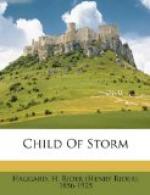“Wow!” said old Tshoza again, for Saduko seemed too astonished to speak, “he is a spirit, not a man. He is holy!”
“Not a bit of it,” I answered. “If you think that, ask Mameena”—a dark saying which they did not understand. “Now, listen. I will not take those cattle because I do not think as you Kafirs think. But as they are mine, according to your law, I am going to dispose of them. I give ten head to each of my hunters, and fifteen head to the relations of him who was killed. The rest I give to Tshoza and to the other men of the Amangwane who fought with us, to be divided among them in such proportions as they may agree, I being the judge in the event of any quarrel arising.”
Now these men raised a great cry of “Inkoosi!” and, running up, old Tshoza seized my hand and kissed it.
“Your heart is big,” he cried; “you drop fatness! Although you are so small, the spirit of a king lives in you, and the wisdom of the heavens.”
Thus he praised me, while all the others joined in, till the din was awful. Saduko thanked me also in his magnificent manner. Yet I do not think that he was altogether pleased, although my great gift relieved him from the necessity of sharing up the spoil with his companions. The truth was, or so I believe, that he understood that henceforth the Amangwane would love me better than they loved him. This, indeed, proved to be the case, for I am sure that there was no man among all those wild fellows who would not have served me to the death, and to this day my name is a power among them and their descendants. Also it has grown into something of a proverb among all those Kafirs who know the story. They talk of any great act of liberality in an idiom as “a gift of Macumazana,” and in the same way of one who makes any remarkable renunciation, as “a wearer of Macumazana’s blanket,” or as “he who has stolen Macumazana’s shadow.”
Thus did I earn a great reputation very cheaply, for really I could not have taken those cattle; also I am sure that had I done so they would have brought me bad luck. Indeed, one of the regrets of my life is that I had anything whatsoever to do with the business.
Our journey back to Umbezi’s kraal—for thither we were heading—was very slow, hampered as we were with wounded and by a vast herd of cattle. Of the latter, indeed, we got rid after a while, for, except those which I had given to my men, and a hundred or so of the best beasts that Saduko took with him for a certain purpose, they were sent away to a place which he had chosen, in charge of about half of his people, under the command of his uncle, Tshoza, there to await his coming.
Over a month had gone by since the night of the ambush when at last we outspanned quite close to Umbezi’s, in that bush where first I had met the Amangwane free-spears. A very different set of men they looked on this triumphant day to those fierce fellows who had slipped out of the trees at the call of their chief. As we went through the country Saduko had bought fine moochas and blankets for them; also head-dresses had been made with the long black feathers of the sakabuli finch, and shields and leglets of the hides and tails of oxen. Moreover, having fed plentifully and travelled easily, they were fat and well-favoured, as, given good food, natives soon become after a period of abstinence.




